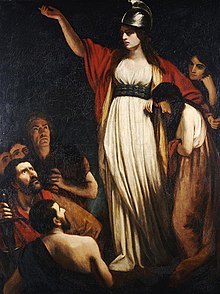| Boudica | |
|---|---|
 John Opie's Boadicea Haranguing the Britons | |
| Queen of the Iceni | |
| Reign | c. AD 60–61 |
| Consort of the king of the Iceni | |
| Tenure | ? – c. AD 60 |
| Born | British Isles |
| Died | AD 60/61 |
| Spouse | Prasutagus |
| Issue | 2 daughters |
Boudica or Boudicca (/ˈbuːdɪkə, boʊˈdɪkə/, from Brythonic *boudi 'victory, win' + *-kā 'having' suffix, i.e. 'Victorious Woman', known in Latin chronicles as Boadicea or Boudicea, and in Welsh as Buddug, pronounced [ˈbɨðɨɡ]) was a queen of the ancient British Iceni tribe, who led a failed uprising against the conquering forces of the Roman Empire in AD 60 or 61. She is considered a British national heroine and a symbol of the struggle for justice and independence.
Boudica's husband Prasutagus, with whom she had two daughters, ruled as a nominally independent ally of Rome. He left his kingdom jointly to his daughters and to the Roman emperor in his will. When he died, his will was ignored, and the kingdom was annexed and his property taken. According to the Roman historian Tacitus, Boudica was flogged and her daughters raped.[1] The historian Cassius Dio wrote that previous imperial donations to influential Britons were confiscated and the Roman financier and philosopher Seneca called in the loans he had forced on the reluctant Britons.
In 60/61, Boudica led the Iceni and other British tribes in revolt. They destroyed Camulodunum (modern Colchester), earlier the capital of the Trinovantes, but at that time a colonia for discharged Roman soldiers. Upon hearing of the revolt, the Roman governor Gaius Suetonius Paulinus hurried from the island of Mona (modern Anglesey) to Londinium, the 20-year-old commercial settlement that was the rebels' next target. Unable to defend the settlement, he evacuated and abandoned it. Boudica's army defeated a detachment of the Legio IX Hispana, and burnt both Londinium and Verulamium. In all, an estimated 70,000–80,000 Romans and Britons were killed by Boudica's followers. Suetonius, meanwhile, regrouped his forces, possibly in the West Midlands, and despite being heavily outnumbered, he decisively defeated the Britons. Boudica died, by suicide or illness, shortly afterwards. The crisis of 60/61 caused Nero to consider withdrawing all his imperial forces from Britain, but Suetonius's victory over Boudica confirmed Roman control of the province.
Interest in these events was revived in the English Renaissance and led to Boudica's fame in the Victorian era and as a cultural symbol in Britain.
- ^ Tacitus. The Annals.